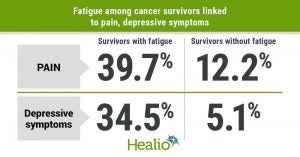Assistant Professor Jung Eun Lee’s study aims to reduce fatigue, improve outcomes
Interventions that target depressive symptoms and inflammation may reduce fatigue among cancer survivors, according to a study by Assistant Professor Jung Eun Lee.
Incidence and severity of cancer-related fatigue vary greatly among individuals. Although the underlying mechanisms are not well-understood, Lee has found that depression symptoms contribute to fatigue. Prior research has also suggested chronic inflammation, particularly C-reactive protein — an inflammatory marker — may be associated with fatigue.
Lee aims to evaluate associations between C-reactive protein, depression symptoms and self-reported fatigue in a population-based sample of cancer survivors in the United States. She has analyzed data from the 2017-2018 National Health and Nutrition Examination Survey, which included 431 participants with cancer.
 Blood samples obtained during study examinations yielded C-reactive protein measurements. Lee performed multiple logistic regression models to estimate associations between C-reactive protein and fatigue. She adjusted these analyses for several variables, including sex, age, race and ethnicity, marital status, education, BMI, smoking status, pain and depression symptoms, physical activity, general health condition and sleep hours.
Blood samples obtained during study examinations yielded C-reactive protein measurements. Lee performed multiple logistic regression models to estimate associations between C-reactive protein and fatigue. She adjusted these analyses for several variables, including sex, age, race and ethnicity, marital status, education, BMI, smoking status, pain and depression symptoms, physical activity, general health condition and sleep hours.
“Higher C-reactive protein levels among survivors with fatigue warrant further longitudinal studies with a broad range of inflammatory markers and multidimensional measures of fatigue and other symptoms to better understand mechanisms,” Lee said.

